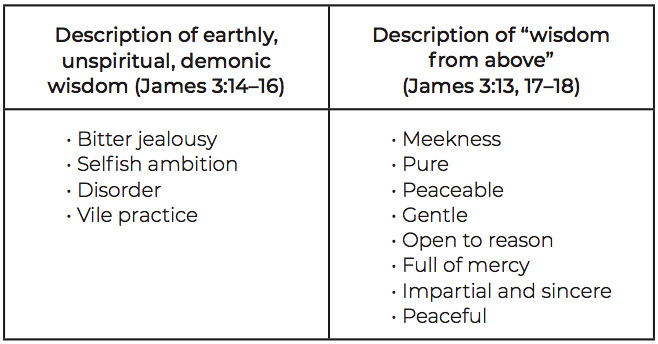

TWO KINDS OF WISDOM
We should also ask, which wisdom do you see in your own life and in those around you? There’s a difference between “earthly” wisdom and “wisdom from above.” Take a moment to read James 3:13–18 and consider the fruits of each type of wisdom.

James likely calls it “demonic” wisdom because it’s an echo of Satan’s lie in the Garden: that life is found in not in trusting God, but being God, “knowing good and evil” (Gen. 3:5). Ecclesiastes wisely reminds us of things we can’t know—that there’s such a thing as information God has withheld so that we might take refuge in him rather than grasping for the security blanket of trying to be God. Such humility produces an openness to reason, a mercifulness, and impartiality that helps us maintain the unity of the Spirit.
A FEW SHEPHERDING SUGGESTIONS
How can we shepherd the flock in times like these? Here are a few suggestions:
1. Preach and teach the Bible with certainty and conviction.
You should have no fear in doing this. When people in turn share their “certain” convictions with you, you can always reply, “I’m not certain about that, but I am certain that Jesus is the way, the truth, and the life because the Bible tells me so.”
2. Encourage people to assume the best in each other.
In challenging times, we tend to assume the worst as a sort of defense-mechanism. Doing so doesn’t promote unity; it hinders it. In 1 Corinthians 13:5, Paul says that love “keeps no record of wrongs.” Strive to forgive, to keep no record of wrongs, and to assume the best.
3. Be the Lord’s servant.
This is what Paul calls us to in 2 Timothy 2:24–25. “The Lord’s servant must not be quarrelsome but kind to everyone, able to teach, patiently enduring evil, correcting his opponents with gentleness. God may perhaps grant them repentance leading to a knowledge of the truth.” Include these things as a prayer list for your pastoral ministry.
4. Teach on the conscience and disputable matters.
We need to know which hills to die on and which things we can disagree on and yet happily be members of the same church. Encourage folks to hold fast and refuse to compromise on gospel truths we can know with certainty; encourage them to be wary of teachers who claim certainty on issues that are disputable. Here are some books you can read or suggest on this topic:
- Finding the Right Hills to Die On: The Case for Theological Triage, by Gavin Ortlund
- Conscience: What It Is, How to Train It, and Loving Those Who Differ, by Andy Naselli and J.D. Crowley
- Living Life Backward: How Ecclesiastes Teaches Us to Live in Light of the End, by David Gibson
This article originally appeared here, and is used by permission.

